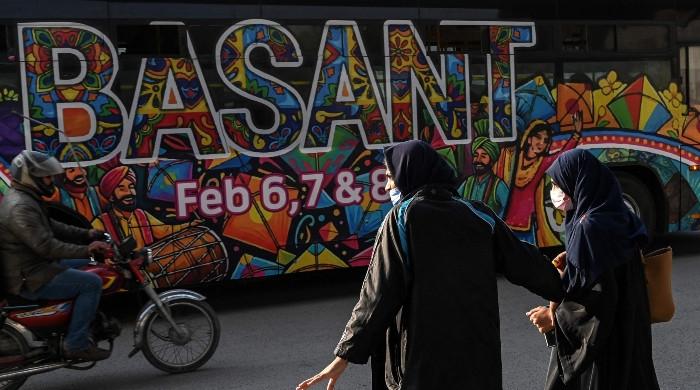We need leaders of the future
These are not mere advisers; they are architects of new era, unafraid to question, challenge, and dismantle outdated structures
January 06, 2024

With just four weeks until the ballot box decides who will be in the saddle for the next five years, Pakistan stands at a precipice, choked by a suffocating polycrisis.
A crippling mountain of external debt with nearly $100 billion payable in the next four years that the country has no means to generate, a fractured and ineffective governance framework and a political stalemate paint a bleak picture.
Currently under an emergency nine-month IMF standby programme that ends soon after elections inevitably leading to the next IMF programme if sovereign default is to be avoided (which will be 25th bailout package from the lender of last resort), there is little hope for any disruptive policies and programmes that can help revive growth, contain inflation, reduce poverty and address other deep-rooted problems irrespective of which political government comes in power with the same mindset that we have seen in the past four decades.
Yet, within this crisis lies a flicker of hope — a chance for transformative rebirth if, and only if, the country votes into power a leadership with changed mindset that has the courage to break from the past band-aids approach of firefighting and self-serving short-term agendas.
This rebirth won’t be achieved through empty promises without major reforms and new breed of leadership willing to rethink, that is, think different from earlier generation of leaders – one fuelled by courage, humility, ambition, risk-taking and a bold embrace of digital transformation across every facet of government, institutions, and the entire economy that can unleash relentless innovation.
Building teams to restructure and reimagine: It’s a no-brainer for all thinking citizens that the future of Pakistan rests not on a single saviour, but on a diverse, high-performing team driven by an audacious vision. The team shouldn’t be a chorus of sycophants, but a vibrant tapestry of expertise and experience, united by a shared vision for Pakistan’s progress based on new realities of the 21st century.
These are not mere advisers; they are architects of a new era, unafraid to question, challenge, and dismantle outdated structures. Such leaders and the team they must built should have following attributes:
One, courage to think different: We need leaders with the courage to promote those who dare to think differently, who challenge the existing norms and raise uncomfortable questions. These are the minds who see beyond the limitations of the past and envision solutions that break free from conventional shackles. They are the ones who will ignite the flames of progress in every corner of Pakistan.
Two, humility to admit mistakes: True leaders recognize their limitations. In contrast to most existing leaders who surround themselves with people competing in praising virtues of the boss and confirm everything the leader says and does, the future leaders must possess the humility to admit ignorance and embrace mistakes of the past as stepping stones for growth. Genuine leaders must recognize that humility is not a weakness; it is the foundation for open dialogue, continuous learning, and genuine progress. Only by acknowledging past shortcomings can we truly build a better future.
Three, ambition to think big: The challenges that Pakistan faces are monumental, demanding leaders with eyes fixed on the horizon, not their feet. We need individuals with ambition to not just survive, but to thrive. These are the visionaries who dream of a Pakistan that leads the world in innovation, prosperity and sustainability, inspiring generations to come.
Four, risk-taking: Innovation does not thrive in the sterile halls of caution. Our leaders must embrace the spirit of risk-taking, understanding that mistakes and failures are inevitable companions on the path to progress. They must create an environment where experimentation is encouraged, where learning from missteps is valued, and where failure becomes a stepping stone to success.
Five, active listening: Leaders must become students of the polycrisis and its underlying causes, attuned to the whispers of hardship in every corner, from bustling Karachi to remote Balochistan. They must foster psychological safety, where vulnerability is not met with scorn, but with empathy and a genuine desire to learn and understand. Only then can diverse voices, often unheard, offer solutions beyond the echo chamber of privilege.
Six, recognition of untapped potential: The future leaders of Pakistan should not reside in gilded halls but in the hearts and minds of the people. Our leaders must possess the humility to admit ignorance and seek talent from every corner, regardless of background or pedigree. Meritocracy, not patronage, must be the cornerstone.
Seven, courage to restructure and reimagine: This team must be a storm, shaking the foundations of outdated systems and policies. They must have the courage to question the existing norms, challenge assumptions, and delve into the uncomfortable truths that cripple progress. They must be champions of intellectual curiosity, constantly seeking new information, embracing divergent perspectives, and pushing the boundaries of what’s possible.
Embracing digital transformation as a lifeline: This commitment to inclusivity, open dialogue, and talent recognition isn’t merely a feel-good notion; it’s the bedrock of innovation, the best weapon to resolve Pakistan’s polycrisis. In a world hurtling towards technological frontiers, Pakistan cannot afford to be bogged down in the world of paper-based manual files and archaic systems of communication. Our leaders must champion the proactive embrace of digital transformation taking benefit of emerging technologies, leveraging their potential to:
Bridge societal divides: Imagine AI-powered digital platforms personalizing education, equipping every child with the tools to excel, regardless of their background.
Revolutionize medicine: Envision telemedicine reaching remote villages, transforming healthcare delivery and saving countless lives.
Transform industry and agriculture: AI and emerging technologies hold immense potential to revolutionize both manufacturing and agriculture, boosting productivity and efficiency.
Empower our people: Equip citizens with the digital skills and access necessary to navigate the modern world. Bridge the digital divide, not with handouts, but with investments in infrastructure, training programmes, and affordable technology.
This is the Pakistan we can build, not with empty promises, but with the relentless pursuit of a digitally powered transformation, fuelled by courage, humility, inclusivity, and a thirst for innovation.
A call to action for Pakistan’s political parties: To the political parties of Pakistan, a stark reality stands before you. Over one-third of our people grapple with poverty, our per capita income ranks amongst the lowest, and crucial human development indicators paint a picture of stark neglect.
For 75 years, Pakistan has navigated turbulent waters, often hindered by a lack of vision, fractured collaboration, and short-sighted agendas. The time for band-aids and empty promises is over. The people of Pakistan yearn for a new paradigm, a leadership that transcends the limitations of the past and confidently strides into the realities of the 21st century.
This is not a call for mere reform; it is a clarion cry for transformation. We urge you, the custodians of our future, to:
Embrace audacious vision: shed the shackles of incrementalism and chart a course towards a Pakistan that thrives, not just survives. Envision a nation where prosperity is not a privilege, but a right, where innovation blossoms in every corner, and where technology empowers every citizen.
Prioritize collaboration over division: Dismantle the silos of political partisanship and forge a spirit of unity. Recognize that the polycrisis we face transcends party lines, demanding collective action and unwavering commitment to the betterment of all Pakistanis.
Seek leaders of the 21st century: Look beyond the familiar faces and actively seek out individuals who possess the courage to restructure and reimagine, the humility to learn from diverse perspectives, the intellectual agility to navigate the complexities of the modern world, and the ambition to think big and dream for a brighter future.
Embrace the digital revolution: Recognize that technology is not a luxury, but a lifeline to survive and thrive in the new world.
The writer is a former managing partner of a leading professional services firm and has done extensive work on governance in the public and private sectors. He posts on X @Asad_Ashah
Disclaimer: The viewpoints expressed in this piece are the writer's own and don't necessarily reflect Geo.tv's editorial policy.
Originally published in The News











